Open internet and inclusive technology
Filter resources
-

Why the electronic green vaccination certificate creates new problems instead of solving them
The National Council in Austria passed a legal basis for the electronic immunity certificate project within two days, skipping any kind of review procedure. The digital passes are not a ticket to a normal life, vaccination is. So, special attention should be paid to maintaining the trust of people and the voluntary nature of vaccination, ensuring that people's rights to privacy and freedom of choice are respected. EDRi's member epicenter.works explains what are the concerns with the deployment of green certificates and suggests alternatives to this project.
Read more
-
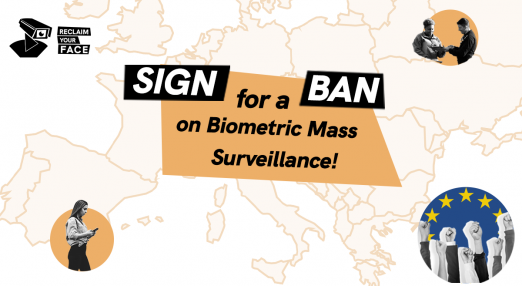
European Commission must ban biometric mass surveillance practices, say 56 civil society groups
On 1 April, a coalition of 56 human rights, digital rights and social justice organisations sent a letter to European Commissioner for Justice, Didier Reynders, ahead of the long-awaited proposal for new EU laws on artificial intelligence. The coalition is calling on the Commissioner to prohibit uses of biometrics that enable mass surveillance or other dangerous and harmful uses of AI.
Read more
-
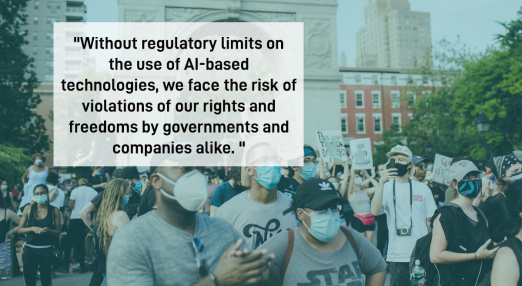
EDRi-gram, 24 March 2021
Human rights mustn’t come second in the race to innovate, they should rather define innovations that better humanity. The European Commission’s upcoming proposal may be the last opportunity to prevent harmful uses of AI-powered technologies, many of which are already marginalising Europe’s racialised communities.
Read more
-
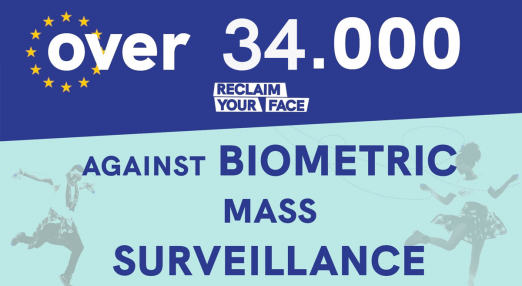
EDRi-gram, 10 March 2021
Unless we take strong action, people in Europe could soon face the end of our privacy and anonymity in public spaces as we know it. We need to rise against the growing use of sinister, unnecessary and disproportionate technologies in our public spaces which abuse our faces. 34,000+ incredible supporters have already joined the fight by officially signing our formal “European Citizens’ Initiative”. Help us reach one million signatures by spreading the word, mobilising your friends and family and even writing to your national or European Parliamentary representatives.
Read more
-

Electronic Frontier Norway (EFN) reports “Shinigami Eyes” to the Norwegian DPA for violation of GDPR
EDRi member Electronic Frontier Norway (EFN) found that the use of the program “Shinigami Eyes” and the operation of the database it uses constitute multiple violations of the GDPR and its Norwegian implementation. The most egregious of these being the clear violation of Article 9 which prohibits the registrations of people’s political views, philosophical convictions and physical persons sexual relations or sexual orientations etc.
Read more
-
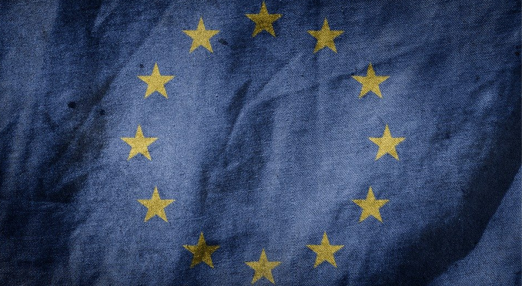
At a glance: Does the EU Digital Services Act protect freedom of expression?
The Digital Services Act is in many ways an ambitious piece of legislation that seeks to make ‘Big Tech’ accountable to public authorities through new significant transparency and due diligence obligations. It also contains many provisions that could help protect users’ fundamental rights. Whether it will be successful at protecting freedom of expression from undue restrictions or reining in the power of Big Tech rather than cementing it, is, however, questionable. EDRi's member ARTICLE 19 share its first thoughts on why.
Read more
-

“Anytime and anywhere”: Vaccination, immunity certificates, and the permanent pandemic
The deployment of vaccines, and in particular any “immunity passport” or certificate linked to the vaccination, must respect human rights. EDRi's member Privacy International (PI) reveals some of the broader human rights, ethical and societal implications of vaccination "passports".
Read more
-
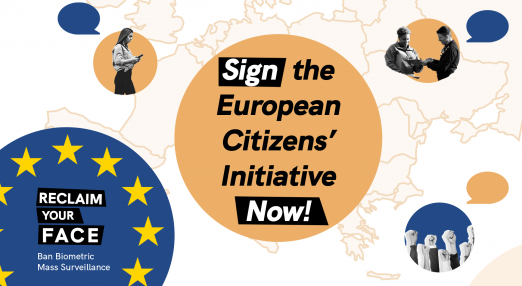
EDRi-gram, 24 February 2021
For years, the EDRi network has exposed how people’s most sensitive identifying characteristics like our faces, fingerprints or the way we walk are unlawfully harvested on an industrial scale by European governments and corporations to make unfair judgements about us without our knowledge. Now, with the launch of our Reclaim Your Face campaign’s European Citizens’ Initiative, we are increasing the pressure on lawmakers to put our rights ahead of big businesses’ profits.
Read more
-
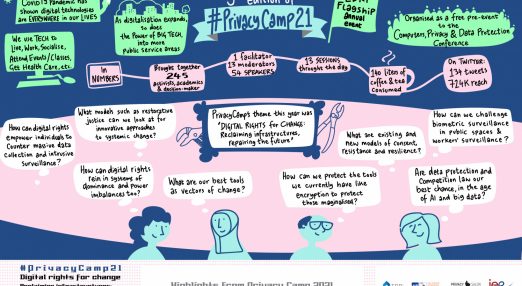
EDRi-gram, 10 February 2021
This edition of the EDRi-gram is jam packed full of national and European insights and examples on how our data and tech is being misused by those in power and what we must do about it! In this edition we showcase another example of how governments in Europe are using discriminatory biometric technologies against marginalised groups. We expose how Big Tech continues to make big profit by expanding into the public sphere, share why breaking encryption would hurt children and adults alike and much more.
Read more
-

We want more than “symbolic” gestures in response to discriminatory algorithms
In an escalating scandal over child benefits, over 26.000 families were wrongly accused of fraud by the Dutch tax authority. Families were forced to repay tens of thousands of euros, resulting in unemployment, divorces, and families losing their homes. EDRi member Bits of Freedom reveals the discriminatory algorithms used by the authority and urges the government to ban their use and develop legislation on Artificial Intelligence.
Read more
-
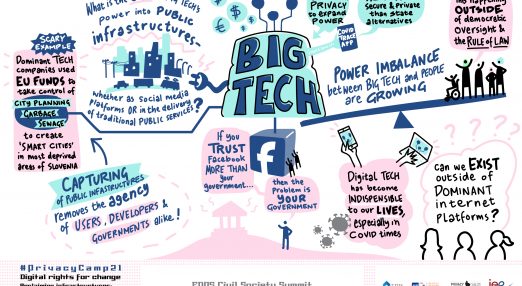
How Big Tech maintains its dominance
As Big Tech deepens its dominance into new public domains, major issues arise around fundamental rights, democracy and justice. This article reflects the conversation that took place at the 2021 EPDS Civil Society Summit which was part of #PrivacyCamp21.
Read more
-

#PrivacyCamp21: Event Summary
The theme of the 9th edition of Privacy Camp was "Digital rights for change: Reclaiming infrastructures, repairing the future" and included thirteen sessions on a variety of topics. The event was attended by 250 people. If you missed the event or want a reminder of what happened in the session, find the session summaries below.
Read more
